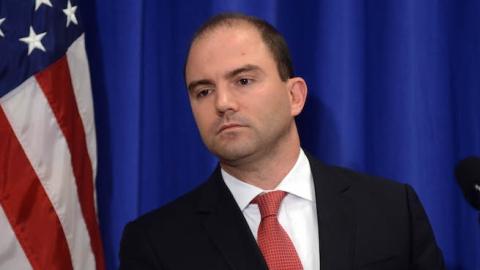Man, Ben Rhodes had an excellent weekend. The 38-year-old Mets' fan who serves as President Barack Obama's deputy national security adviser for strategic communications got to watch the press tear itself apart in rabid confusion, which proves one of his essential points—the U.S. media is a pile of dung.
After a New York Times Magazine profile of Rhodes hit newsstands Saturday night—it was posted on the Times website Thursday—the media split: The article was a hit job by author David Samuels, a crypto-neocon sent by the Mossad who opposed the Iranian nuclear deal from the outset. Or it was a gross puff piece by David Samuels, a Brooklyn liberal who was in the bag for Rhodes even before he was gifted with a box of M&M's with the presidential seal.
Lots of people don't know why the administration let Rhodes pull back the curtain. Because the White House won the Iran Deal is why. They wanted to take a victory lap. Obama campaigned as the anti-Iraq candidate. Bush lied and got us into a stupid war, the White House would invariably argue. __And yes, as president Obama lied to sell the Iran deal—BUT to keep America out of a stupid war with Iran. Do you want American passion and innovation tied down in a severely damaged part of the world like the Middle East for the next hundred years? This is how a very large number of New York Times__ readers understood the piece. And as Rhodes knew, it's how virtually everyone outside of media circles in Washington and New York would read the article.
Lots of media people can't figure out why Rhodes spoke to Samuels, of all people. As evidence of Samuels' pre-existing hostility to the White House, some in the Twitter-sphere posted a video of a panel at Hudson Institute I hosted where Samuels appeared with Matthew Kroenig and Michael Doran, both of whom, like me, are outspoken critics of the deal. Samuels wasn't there to discuss the deal as such. I invited him because I know him, and because he writes stuff I like. He said yes and maybe regrets it now, or not.
He's not part of what Ben Rhodes calls the blob and his boss calls the Washington, D.C. foreign policy establishment. I know him from New York, when I edited the Village Voice Literary Supplement. He was a Brooklyn neighbor, and a baseball fan, and we still hung out even though our political views were often not in synch. I read his 2008 New Yorker article about a truck driver who built a nuclear bomb—a story that highlights the difference between nuclear knowledge, which is easy to come by, and the industrial infrastructure to support the manufacture of nuclear weapons, which is very difficult and costly to build and maintain. For instance, as Samuels told me over the phone for a Weekly Standard article, he said he has the blueprint to make a nuclear bomb in his desk at home—thankfully, no one has given him tens of billions of dollars to build the infrastructure that would allow him to proliferate.
Yes, Rhodes knew what he was doing because you can Google David Samuels on the Internet and find links to many different articles he's published in places like Harper's, The New Yorker and the Atlantic. It's a very hip and young White House, so I'm betting they have a cast of talented young people who are expert at Googling. Rhodes almost certainly read Samuels' great article "The Runner," and his famous profile of Yasser Arafat, and likely his piece on Obama for the New Republic in 2008. "Invisible Man" is Samuels' take on America, media, and race, riffing on the Ralph Ellison novel that he sees at the heart of Obama's enterprise. It's a stylish piece of political reporting and cultural analysis. Rhodes sees himself as fundamentally a writer, he is interested in literary things, like Don DeLillo. __Guess who I don't want to speak to about the awesome things we did to drive the other side crazy over how we sold the Iran deal? Rhodes was likely thinking. Guess who I don't want to spend the next five weeks with and share my ideas about media and politics and foreign policy with? Right, the guys we used to sell the Iran deal. The "echo chamber."__
And now, the echo chamber is mad—but not at Ben Rhodes for what he said. They're mad at Samuels for getting the story they didn't—or didn't even see was there, and they're mad at him for what he reported. The Washington Post has published three different pieces on Samuels, none favorable, including one by the editor of the book section. The Post is mad of course because the Samuels piece publicly shamed the paper—after all, its main brief is to cover the local industry—the workings of the government of the United States. And yet as the article makes plain, Post reporters and especially columnists got spun and conned about the Iran deal. But much worse than that is that the Post got scooped on the story explaining how gullible they are. Scooped by the New York Times, in their own backyard on the biggest foreign policy story of the past four years! That's embarrassing.
And Jeffrey Goldberg is hopping mad, too. The Atlantic just posted his long and seething rejoinder to Samuels, who wrote in his Rhodes piece that, "handpicked Beltway insiders like Jeffrey Goldberg of The Atlantic and Laura Rozen of Al-Monitor helped retail the administration's narrative."
Goldberg writes that he called Rhodes for a clarification. "I asked Rhodes if he told Samuels that he, or other administration officials, had ever handpicked me to retail their case for the Iran deal." That is, "Ben, did you tell Samuels I'm a White House shill?" Surprisingly, as Goldberg relates the conversation, Rhodes did not admit to him that he sees the frequent visitor to the Oval Office, who recently published a long profile of Obama running down allies and boasting of his achievements, as a Beltway insider who was handpicked to retail the administration's narrative. Not in those exact words anyway. In his actual response, Rhodes showed a talent for euphemism: "I told him that our goal was to try to convince you," he told Goldberg, "and a handful of other columnists that the Iran deal wasn't a total catastrophe."
Goldberg considers "it a strange lapse on the part of the Times Magazine to keep from its readers the fact that Samuels was an ardent opponent of the Iran deal, and was advocating, as early as 2009, for the bombing of Iran." That's incorrect. In 2009 Samuels published an article in Slate where he wrote:
From a U.S. point of view, at least, there is little reason to doubt the analysis that a nuclear Iran with a few dozen bombs can be contained at relatively limited cost using the same strategies that successfully constrained an aggressive Soviet Empire armed with nearly 45,000 nuclear warheads at the height of the Cold War.
The article is an exercise in rational choice theory. The United States can afford to let Iran have nukes, but Israel can't. There's no advocacy here, just analysis. Goldberg should correct his claim, since it's false. But he's really, really mad, which is the likeliest reason that he lashed out at Samuels' wife. That's shameful.
He also seems to have lost focus, which is why he rushed to the defense of Laura Rozen, who draws her paycheck from a news organization owned by a Syrian-American businessman who supports Bashar al-Assad. Her employer, Al-Monitor, is the only U.S.-based media organization that has a pro-Hezbollah correspondent reporting from the Hezbollah front lines in Syria. The New York Times Magazine sure doesn't provide that kind of coverage, but maybe Rozen and her supporters think that's just evidence the Times is biased.
Rozen is super furious about a quote from the Rhodes aide who was responsible for running @TheIranDeal twitter feed. "Laura Rozen was my RSS feed," said Tanya Somanader. "She would just find everything and retweet it." Rozen, who says she's never met Somanader, nonetheless claims to know the White House staffer's mind and says Samuels is misreading her statement. "Samuels misunderstands or mischaracterizes what staffer-who I don't know-saying. she said she followed my Twitter feed. he reverses it," tweeted Rozen. Over the weekend, scores of journalists joined Rozen's bizarre hermeneutic exercise in an effort to defend her.
"Laura Rozen (@lrozen ) has been the best & most informative feed on #IranTalks. You rock Laura! Keep going," tweeted Abbas Aslani, "the General Director of World and FP at Tasnim News Agency," a news organization affiliated with the Islamic Revolutionary Guards Corps.
"@abasinfo the writer who slandered me seemingly has contempt for both the negotiations with Iran, the journos who cover them, & who tweet," responded Rozen, sharing thoughts about journalism with a journalist from a propaganda wing of an institution that imprisons, tortures, and murders journalists.
Lots of journalists are defending Rozen. It's curious because when it came time for Rozen to choose between journalists and the echo chamber, she sided with the latter. After the AP reported in August that the Iran deal would allow Iran to conduct its own inspections of the site at Parchin, the echo chamber (like Vox) sprang into action, questioning the veracity of the IAEA document the report was based on and accusing the AP of getting it wrong. One of the echo chamber's more bizarre allegations was that the IAEA document was an Israeli forgery. "Hm. Netanyahu has used "Islamic State of Iran" for IRI as it's oddly called in draft AP reported on," Rozen tweeted.
"My interest in the Iran nuclear negotiations had nothing to do w/ retailing the admin position, as Samuels inaccurately portrays it," Rozen tweeted over the weekend. Does anyone who has actually read Rozen's journalism, or tweets, doubt that she advocated on behalf of the deal? She might be right, that it's an excellent agreement, and it has saved America from a war with a civilization we should hold close to our bosom, but she's not neutral. From her perspective, there was no honest opposition to the deal. Those against it were taking orders from Israel. "I do not think Israel is being well served by people they have picked on U.S. side to promote their talking points," Rozen tweeted about Mark Dubowitz, executive director of the Foundation for the Defense of Democracies in November, 2013.
So why is so much of the press defending Rozen against Samuels? Why are they holding Samuels accountable for reporting what Rhodes said? Rhodes tried to smooth some ruffled feathers when he posted a short piece on "Medium" Sunday night. But he didn't deny what he said about the echo chamber and he's not going to. Who knows, maybe what Rhodes said about 27-year-old reporters who "literally know nothing" will force the press to look at itself in the mirror. But I doubt it.
The reason so much of the media is going after Samuels is because they don't want to believe Rhodes said it. It can't be real. The quotes couldn't have been fact-checked. They're not interpreted correctly. Oh, Rhodes said it, for sure. But why? Yeah, why attack allies who helped the White House push through Obama's signature foreign policy accomplishment?
For the same reason that anonymous White House officials called the prime minister of Israel "chickenshit." For the same reason that Obama called American partners "free riders." For the same reason Obama shamed the leaders of two of America's closest allies, France and the United Kingdom, in public. Because that's what this president and this White House is about, humiliating allies and friends. Why would it treat its own Iran Deal echo chamber any better?
















